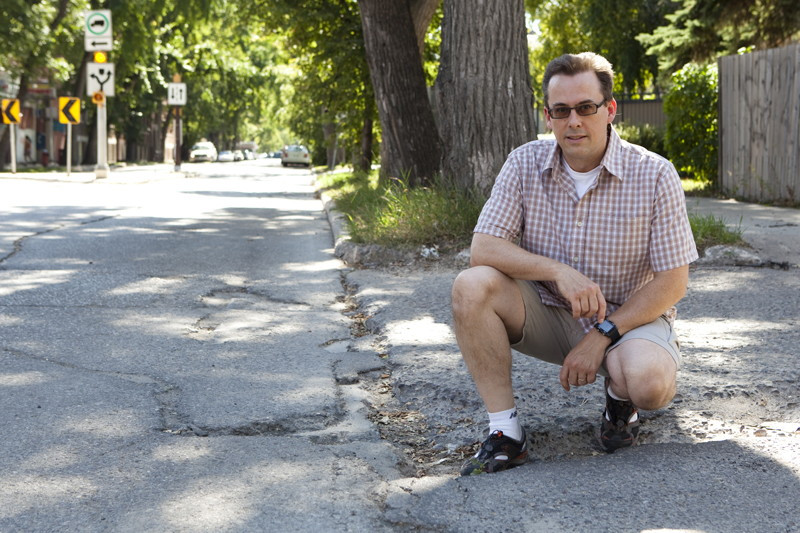To fix a crumbling province
Experts and political leaders talk municipal infrastructure deficit’s role in the 2011 election
With an $11 billion provincial infrastructure deficit and a seemingly perpetual need to repair roads, bridges, sewers and buildings, Manitoba’s civic governments are in need of dire help from the provincial government.
Michael Dudley, a senior research associate for the University of Winnipeg’s Institute of Urban Studies, contends provincial intervention is a necessity.
“American cities have broader revenue generating ability through income tax and various levies,” he said. “In Canada, our cities have to go to the province. Property taxes will not do it.”
Paul Hesse, the Liberal candidate running in Fort Rouge, said infrastructure problems are in part attributed to a large income imbalance between the municipalities and the province.
“For example, even though the city of Winnipeg makes up half the population and residence of the province, the province still has 16 times more money to allocate than the city,” Hesse explained.
Indeed, last year the City of Winnipeg’s operating budget came close to $817 million, while the province’s sat at $13.4 billion.
However, the sprawling tendency of Manitoba’s municipalities is as problematic as an imbalanced government income.
Hesse explained that, of all Canadian cities, Winnipeg has the lowest density growth rate. This means that for each new resident, Winnipeg grows further outward than any other city. As a result, the city must build new infrastructure to accommodate new residents, furthering the deficit.
“That means more roads per person, more sewer lines per person, more infrastructure needs per person,” said Hesse.
Joel Masi, executive director of the Association of Manitoba Municipalities (AMM), is worried by how the deficit might affect municipalities.
“It is stopping communities from developing,” he said. “They can’t grow without the resources.”
Dudley also argues that, in the face of climate change, Manitoba’s infrastructure problems could prove disastrous.
“We need to consider the future, where energy will be more expensive and climate change influence will be more pronounced,” he said. “We need new and different types of sustainable infrastructure. We need to be able to withstand more extremes like storms and drought.”
In June, the AMM launched its Put Communities First campaign, dedicated to making municipal infrastructure deficit a central issue in the 2011 provincial election.
Part of the campaign, explained Dudley, is the call to use one percent of the provincial sales tax to fund municipalities.
“For every tax dollar raised in Canada, the federal government gets 50 cents, the province 42 and municipalities eight,” said Dudley. “This limits municipal ability to grow and deal with a lot of problems.”
Three parties, three solutions
Jean-Marc Prevost, spokesperson for the NDP, explains that the NDP has dedicated one point of the PST to municipal infrastructure.
“This means improved predictability, more growth and greater accountability for Manitoba,” he said.
Jean also contends that the province’s municipal support is already the most generous in Canada.
“Over the past six years, provincial grants supporting municipal infrastructure have grown by (more than) 50 per cent,” he said. “As well, Manitoba’s the only province to share income tax with municipalities and provincial revenue sharing has almost doubled since 2000.”
However, Winnipeg Mayor Sam Katz and other municipal representatives claim the NDP aren’t giving municipalities enough to tackle their burgeoning infrastructure deficits.
While Winnipeg continues to push the province for one percentage point of the provincial sales tax (PST) – which would have amounted to more than $200 million – the 2011 provincial budget included only one per cent of total revenue from the tax, which, according to the city, adds little to municipal coffers.
Gord Steeves, PC candidate for Seine River, said the PC party has committed $375 million for infrastructure.
“What’s more important though is to be in direct contact with municipalities and to focus on their priorities,” said Steeves. “As a former city councillor, one of the biggest issues I saw was that there was no connection to municipalities.”
Though the Liberal party cannot speak to details about their municipal plan because they have yet to release their campaign platform, Hesse did explain the party believes money will not be enough to fix this problem.
“We are really trying to get away from this idea that if you make announcements about money and infrastructure that it will deal with the problem,” said Hesse. “From us, there will be more concrete proposals on the platform.”
Hesse stated that the key to improving infrastructure problems is to limit sprawl by using building space more efficiently. In other words, have more taxpayers per kilometre.
“One of the things we have talked about is smart growth,” he said.
“For example, in the Fort Rouge yards, we can see 900 units of housing built on unused land and make use of an already existing school, fire hall and community centre rather than spending money on new infrastructure.”
Published in Volume 66, Number 3 of The Uniter (September 15, 2011)







